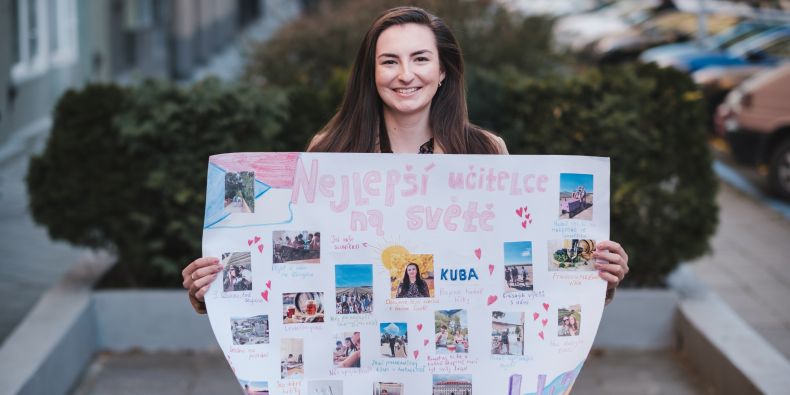She was involved in teaching Czech to Ukrainian students from the very beginning and it was one of her first experiences with teaching refugees, even though she is already in her second semester of studying Lower Secondary School Teacher Training in Czech Language and Literature for Pupils with a Different Mother Tongue at the MU Faculty of Education.
“I am very happy that I could help in any way. I really admired the students and how they managed to reach B2 fluency level in Czech in just four months. But when you have four hours of lessons a day plus two hours of self-study, you learn the language quickly. Especially if you are a Slavic speaker,” explains Eliška.
She taught the first group from May to August and the second from October to December, with about 18 students in each group. Throughout the teaching period, she tried to follow one simple rule – to create a positive atmosphere in the classroom and make the students feel comfortable. She also varied the lessons by playing games, adding words to Czech songs, practising Czech diacritics (which the students struggled with the most) and even discussing controversial topics that the students really wanted to talk about because otherwise it was quite a challenge to get them to talk.
As a result, her students enjoyed the lessons as much as she enjoyed teaching them. They even prepared a little surprise for her in the last lesson – a poster they had made together “for the best teacher”, full of photos, thanks and wishes for the future.
After completing their Czech language course, the students began studying at various MU faculties. Eliška admires them for how well they manage, and she has had many skilled and talented students in both groups. For example, one is now studying at the Faculty of Law and has enrolled in courses worth 70 credits in the first semester. She was also very pleased to see that one of her former students, who is now studying journalism, is writing articles in Czech at a very high level, and they keep in touch. Eliška even invited her to her mother’s house for the Easter holidays.
“Teaching Ukrainian students gave me a lot of experience and I will remember the first class I taught for the rest of my life. I’m so glad that MU has set up adaptation courses to help students integrate more quickly. But it was a challenge to organise everything so quickly. We were always in contact with the management and staff of the Language Centre, training each other and sharing materials, so I learnt a lot from more experienced colleagues. This job also made me realise that teaching Czech to foreigners is exactly what I want to do in the future,” says the Czech teacher and student at the Faculty of Education.

